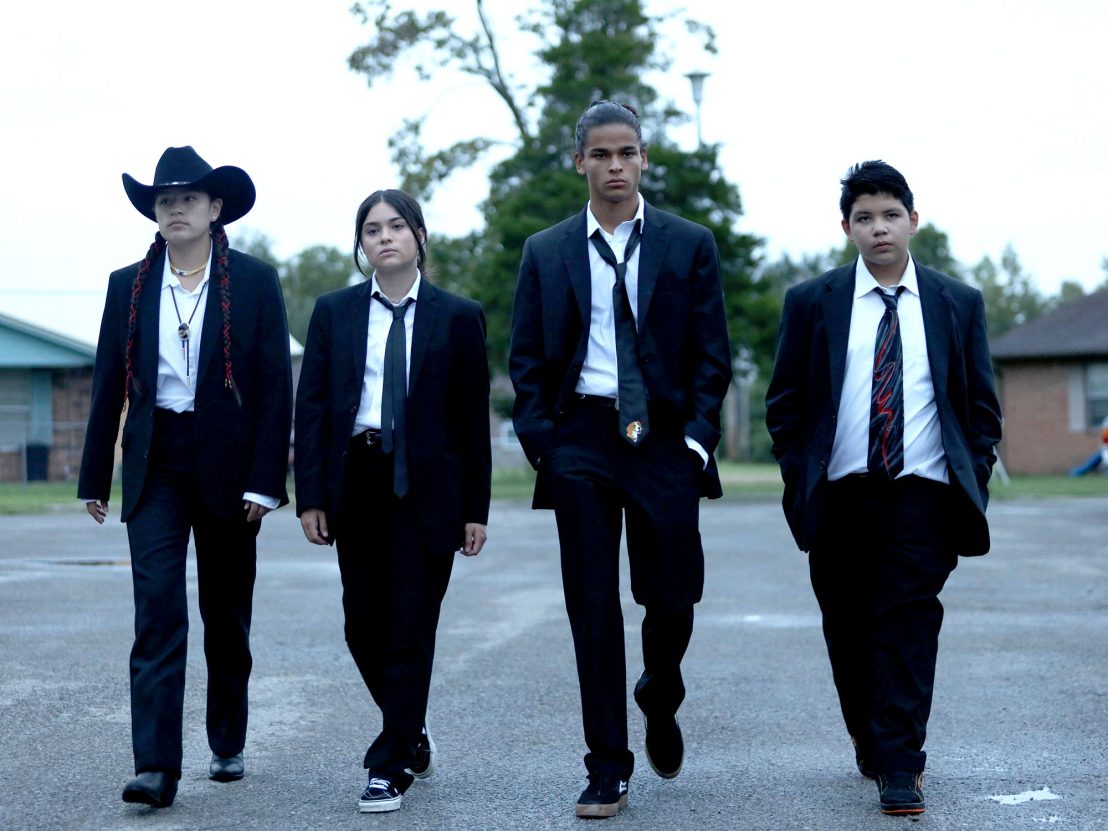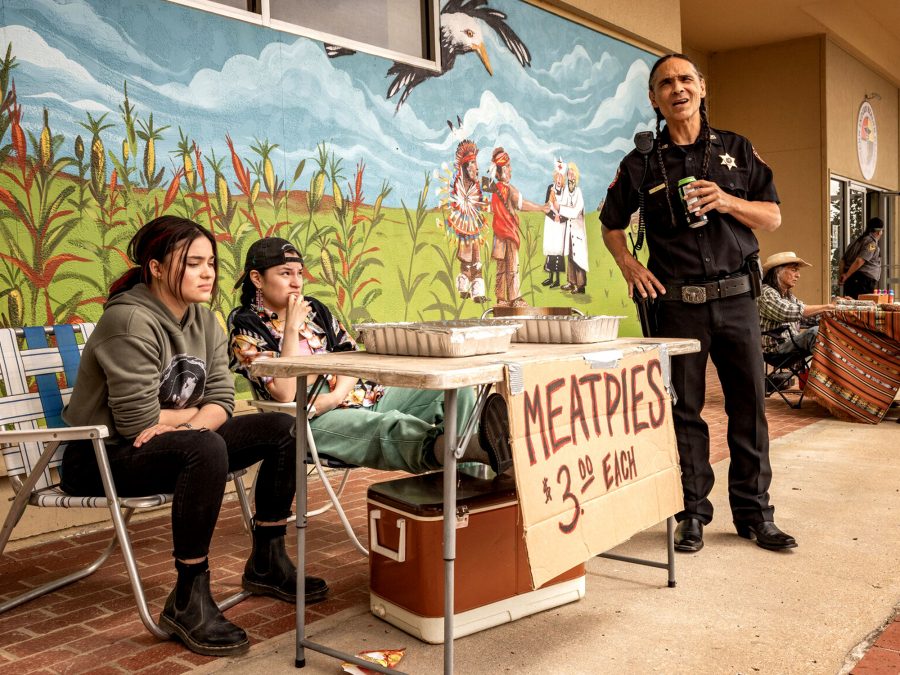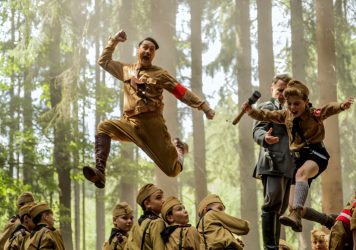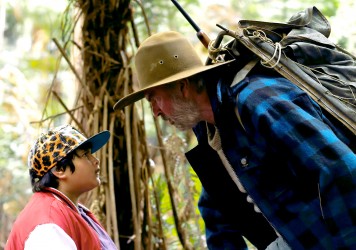
In recent years, more and more directors have taken it upon themselves to make our white-washed television screens more culturally and ethnically diverse. In 2018, Tanya Saracho brought us Vida, depicting the lives of the queer Latinx community in Los Angeles’ Boyle Heights. Mindy Kaling’s 2020 coming-of-age Netflix show Never Have I Ever follows the adventures of Devi (Maitreyi Ramakrishnan), a teenage Indian-American Tamil girl who helps her audience to unlearn all the Asian stereotypes they have been fed over the years. And now we have the indigenous Reservation Dogs of rural Oklahoma, courtesy of Sterlin Harjo and Taika Waititi.
Opening with the local Indian Reservation’s radio station K49: Territory Jams, we meet the titular group of friends as they are about to rob a truck full of Flaming Flamers chips, to the sound of The Stooges and ‘I Wanna be Your Dog’. Before the pilot episode ‘F*ckin’ Rez Dogs’ even reaches the end of its opening sequence – which includes a sensible discussion as to whether wearing a seatbelt will diminish the bad-assery of the robbery, and a not so subtle get away with sparks literally a-flying – the protagonists’ personalities have been established.
Bear (D’Pharaoh Woon-A-Tai) considers himself the leader of the group, much to the amusement of Elora Danan (Devery Jacobs) and Willie (Paulina Alexis), who clearly have the say here. They are the ones continuously coming up with and overseeing money-making schemes to support their California dreaming, their hopes for a light on a beachy horizon.
Whether they’re selling their stolen chips or meat pies made with shoplifted ingredients, Willie and Elora Danan keep a check on the finances, with their minds set on raising the necessary funds to relocate from Oklahoma to California within two months. Elsewhere, Cheese (Lane Factor) is the soul of the group; calm and soft-spoken, child-like in his physical appearance. Yet something about him suggests he possesses the kind of emotional maturity the others lack.
Once the dust has settled on their speedy get away and they’ve traded in the truck for hard cash at the local scrapyard – home to the “meth-head apocalypse” – we’re let into a little backstory by ways of Bear’s school video project. It shows him inviting the viewer to get to know him, his group of friends, their secret hangout, and the local Catfish dive where they go for lunch whenever they can scrape together enough money.
It also makes us aware of a recent loss to the group: Daniel, for whom a memorial is being planned. Their deep sense of grief, and the realisation that their own environment killed him, gives even urgency to their plan to escape their dreary lives. Shot entirely on location at the Muscogee Nation reservation, the sparse urban backdrop enhances the feeling of restlessness these kids are experiencing.
When Elora Danan – whose name presents various opportunities for Willow references – announces that their chip-truck heist is getting them closer to California, Bear finds himself unsettled rather than ecstatic. Always looking at things rationally, and frequently visited by his chaotic spirit-guide, William Knife-Man, he is not sure whether running away is the answer. Prompted by William’s question, “What are you doing for your people?”, Bear comes to the conclusion that there is more pride in becoming vigilantes than petty criminals.
Upon hearing about the repercussions the driver of the stolen truck suffered due to their actions, it becomes clear to Bear that, in this community, they are all in the same boat, and it’s time to work with one another instead of against each other – a fact Elora Danan and Willie need a little more convincing of.

The second episode, ‘NDN Clinic’, is presented almost like a bottle episode, mainly taking place at the town’s “Indian clinic” where the crew finds themselves after Bear is jumped by the Indian Mafia and left with a rearranged nose.
While Elora Danan and Willie use the opportunity to sell meat pies next to old man Fixico, who is selling real, natural-based medicine, Cheese, who was just looking to steal some chocolate at the clinic’s reception, gets talked into taking an eye exam. If the episode’s tempo is slow, its wit is as quick as the premiere episode.
Within the NDN clinic – where Elora Danan’s stomach ache is attributed to her 15-pack-a-day intake of Flaming Flamers, and Bear, much to his dismay, is given the okay to keep on getting into fights – everyone is suspicious of the white man. Not only is their medicine regarded as bad, the town’s police officer, “Big” (Zahn McClarnon), refers to the sugary drinks in the vending machine as “white man’s bullets” – although he’s not opposed to buying a can of a cheap-looking energy drink, insisting to Bear that it is made of actual energy.
There’s a general lack of patience and empathy from both the admission’s office and the doctor, which ties in quite beautifully with Cheese’s taking on the role of a bedridden old lady’s grandson and granting her a simple wish: To see the trees dance against the skyline. Just like home.
Published 9 Aug 2021

By Jake Cole
Taika Waititi takes aim at the Third Reich (and contemporary fascism) in this paper-thin satire.

By Poppy Doran
The Kiwi writer/director talks poking fun at his homeland and why he won’t be making movies forever.

By Anton Bitel
Taika Waititi lays on the charm in this storybook adventure yarn about a young Maori orphan.